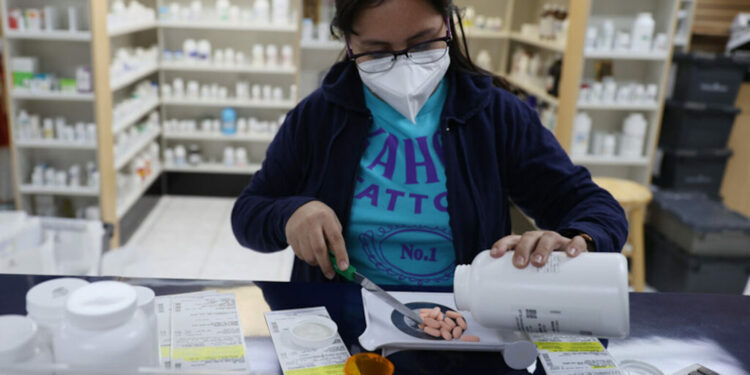Some states are taking action to reduce prescription drug prices by requiring drug manufacturers to maintain the availability of affordable medications to numerous pharmacies through a federal drug-discount program.
Under the 32-year-old 340B program, pharmaceutical companies participating in Medicaid are required to offer discounted prices on outpatient drugs to clinics, community health centers, and hospitals that primarily cater to low-income patients. The program aims to provide providers with the opportunity to utilize the savings, ranging from 20% to 50% off the regular price, to enhance and broaden their services for the benefit of the community.
In 2010, the federal government expanded the 340B program to include contract pharmacies. This allowed health centers and hospitals without in-house pharmacies to partner with external pharmacies for the distribution of drugs to eligible patients. According to a recent study by the University of Minnesota School of Public Health, 71% of locations from the top four pharmacy chains—Walmart, CVS, Rite Aid, and Walgreens—participate in the 340B program.
Drug manufacturers argue that the 340B program has expanded well beyond its initial purpose and that certain hospitals keep the savings for themselves instead of using the funds to enhance their services. Some research supports this claim.
In 2020, seven prominent pharmaceutical manufacturers made a declaration to limit or cease the sale of 340B Health to contract pharmacies. This decision was based on the fact that federal law does not mandate such sales. According to 340B Health, an advocacy group that represents over 1,500 public and private nonprofit hospitals and health systems, as of September last year, 25 drugmakers had already implemented these restrictions.
Nicole Longo, deputy vice president for public affairs at Pharmaceutical Research and Manufacturers of America, a trade group representing drugmakers, expressed concerns regarding the lack of evidence showing improved access and lower costs for patients, despite the industry’s continued provision of discounts.
Several states are taking action to counter the rising costs of prescription drugs. In recent years, states like Kansas, Maryland, Minnesota, Mississippi, Missouri, and West Virginia have passed laws that mandate drug manufacturers participating in Medicaid to provide discounted drugs to contract pharmacies. Arkansas took the lead in 2021, becoming the first state to enact such legislation, followed by Louisiana in 2023. This year, New York and other states have also been considering similar bills to address this issue.
West Virginia Republican state Sen. Tom Takubo, the sponsor of the legislation in his state, expressed that maintaining services and keeping a hospital open is a challenging task. Thus, he emphasized the significant assistance provided by 340B when it was introduced, as reported by Stateline.
According to Takubo, the pharmacies in the periphery were facing a problem as the delivery of medications was abruptly halted by the suppliers. In response to this issue, a bill was passed to address the problem and ensure that the pharmacies receive their deliveries. The bill also includes the provision of imposing fines on the suppliers who fail to comply with the delivery requirements.
340B expansion
The expansion of the 340B program in 2010 brought about a significant increase in access to discounted drugs. A study published in JAMA Health Forum revealed that the number of retail pharmacies participating in the program skyrocketed from 789 in 2009 to 25,775 in 2022. This expansion has led to a significant improvement in accessibility to affordable medications.
According to the Congressional Budget Office, patient spending on 340B discounted drugs has seen a significant increase over the years. From 2010 to 2021, it has risen from $6.6 billion to $43.9 billion.
According to Karen Mulligan, a research assistant professor at the Sol Price School of Public Policy at the University of Southern California, there are valid arguments to consider on both sides of the debate. She explains that the primary objective of the 340B program is not to provide subsidized drugs for low-income patients, but rather to provide financial assistance to community health centers and rural hospitals that are facing financial challenges.
The federal government started permitting those organizations to utilize contract pharmacies because many of them did not have their own pharmacies, according to Mulligan. However, she noted that the expansion of the 340B program has also attracted hospitals that are financially well-off even without 340B. Moreover, due to the lenient reporting requirements for hospitals in the 340B program, it remains uncertain whether they are utilizing the savings to enhance patient care.
Mulligan highlighted the challenge of attempting to rein in the program, as it could potentially have negative effects on all providers. This includes both providers who rely on the savings to cater to low-income patients, as well as those who do not have the same needs.
According to Stateline, Mulligan emphasized that the program’s current appearance does not align with its original purpose, which is why there are varying opinions from different individuals.
A broad range of patients
Critics of the 340B program argue that hospitals located in wealthier neighborhoods are the ones benefiting from the discounts.
According to Joey Mattingly, an experienced pharmacist and associate professor of pharmacy at the University of Utah, health care providers that utilize contract pharmacies serve a diverse patient population. The revenue generated from these partnerships plays a crucial role in keeping these hospitals operational.
According to Mattingly, the elimination of the hospital and its unavailability in the community would result in longer travel distances to reach a hospital. While he acknowledges that the discontinuation of the 340B program wouldn’t cause an immediate closure of hospitals, he believes that it would lead to significant and impactful changes.
According to Mattingly, many hospitals and clinics utilize the cost savings to implement changes that are not only financially beneficial but also advantageous to patients. One such change could involve providing free or discounted medications within the facility, allowing patients to obtain them immediately. This approach increases the chances of patients actually taking their prescribed medicine, thereby reducing the risk of expensive hospital readmissions.
According to Aimee Kuhlman, the vice president of advocacy at the American Hospital Association, the 340B program plays a crucial role in generating substantial savings for hospitals. These savings are then utilized to benefit patients in various ways.
“The truth is, pharmaceutical companies are not willing to offer discounts to hospitals or the patients they care for; instead, they want to retain those discounts for themselves,” Kuhlman shared with Stateline. “Undeniably, the 340B program plays a vital role in supporting eligible hospitals and the patients and communities they serve.”
Participation in Medicaid is not mandatory, and pharmaceutical companies have the option to decline providing the 340B discounts, according to Greg Havard, CEO of the 49-bed George Regional Health System in Lucedale, Mississippi. Lucedale is a small city located near the Gulf Coast with a population of a few thousand people.
Angry patients spur new state watchdogs to bring down drug prices
According to Havard, pharmacy manufacturers have agreed to sell specific drugs at a reduced price, and the purpose of the 340B program is to assist in recovering costs incurred for services and facilities provided to patients. The program aims to support healthcare providers in keeping their operations running smoothly. Havard expressed the need for legislation due to pharmaceutical manufacturers discontinuing their contract pharmacies, which have been in practice for 15 years, during the height of the pandemic.
Vacheria Keys, the associate vice president of policy and regulatory affairs at the National Association of Community Health Centers, emphasized that the facilities she represents prioritize allocating their 340B savings towards patient care. According to Keys, this program plays a crucial role due to the fact that the federal funding received by community health centers is no longer as sufficient as it once was.
Pharmaceutical companies are currently contesting the recently implemented state laws through legal means. Recently, in a bid to halt Mississippi’s law, drugmaker Novartis sought intervention from a federal judge, only to have their request denied. However, undeterred, the company has expressed its intention to appeal the decision.
Robert Dozier, executive director of the Mississippi Independent Pharmacies Association, expressed his enthusiasm for the recent state law and the court’s ruling.
“We are seeing an increase in the number of well-known drug manufacturers joining us,” Dozier explained to Stateline. “This allows us to have access to a wider range of medications, enabling us to assist a larger number of individuals within the community.”
Stateline, a member of States Newsroom, operates as a nonprofit news network and is backed by grants and a coalition of donors as a 501c(3) public charity. Maintaining its editorial independence, Stateline is dedicated to delivering unbiased news and analysis. For any inquiries, please reach out to Editor Scott S. Greenberger at [email protected]. Stay updated with the latest from Stateline by following us on Facebook and X.




